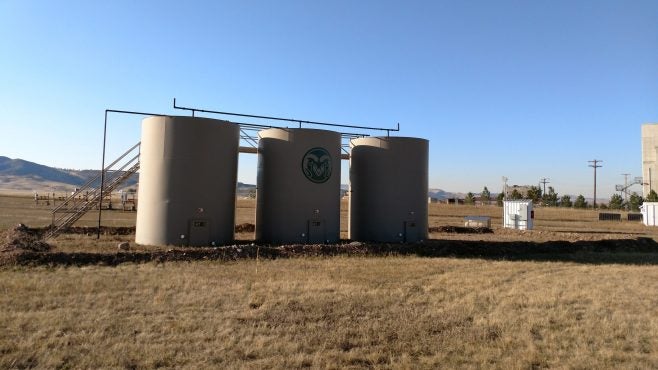Joe Biden’s election created an opening to launch a global effort clean up methane emissions. Europe says it wants to help lead such an effort. President Biden should accept the invitation and tap his climate envoy, John Kerry, to help assemble a coalition of countries willing to reduce their methane pollution.
Methane, the primary component of fossil (natural) gas, is emitted by agriculture, landfills and fossil fuel production. Limiting emissions of the short-lived, but potent, greenhouse gas should be an easy win for the climate.
Former President Donald Trump was committed to removing regulatory restraints on fossil fuel companies – even when industry wasn’t asking for an intervention. Senior officials at the Environmental Protection Agency (EPA) appointed by Trump halted efforts undertaken by the Obama administration to reduce methane pollution from new and existing oil and gas operations.

Joe Biden directed the EPA to develop new rules to reduce methane emissions from the oil and gas sector on his first day in office. The $2.25trn infrastructure and jobs plan the White House released last month proposes spending $16bn to plug hundreds of thousands of abandoned oil and gas wells.
“In addition to creating good jobs in hard-hit communities, this investment will reduce the methane and brine that leaks from these wells,” says a fact sheet on the plan.

US Tariffs are shifting - will you react or anticipate?
Don’t let policy changes catch you off guard. Stay proactive with real-time data and expert analysis.
By GlobalDataWith a willing partner in the White House, Europe is ready to launch a global effort to rein in methane emissions, says European Commission energy official Brendan Devlin.
“Methane is very much something on which we want to find a quick agreement with the US, and with Canada, Japan, China and Korea,” Devlin said during a recent panel discussion hosted by Sciences Po and Columbia University’s Center on Global Energy Policy.
Devlin identified reaching “a broad agreement on the reduction of methane emissions in the global atmosphere” as one of three EU priorities for the EU-US relationship in the lead up to COP26 in Glasgow.
“If we could bring down methane emissions to the technical limit by 2030, we could cut off about 0.18–0.3°C by 2050,” says Devlin. “That might not seem a lot, but it is one-third of everything we need to do in order to hit our 1.5°C pathway until 2050.”
Even better, by capturing methane otherwise lost to leaks, emissions reductions can be achieved at a profit.
“If we are able to reduce methane emissions by 50–80% in the oil and gas sector, they are cost-positive methane emissions. They will make us money,” Devlin added.
However, having experienced the whiplash of countervailing US political currents – Bush to Obama, Trump to Biden – the EU understands the need to keep the US engaged as a constructive force in global climate mitigation efforts over the long term, Devlin said. Ratification of treaties negotiated by the executive branch requires a two-thirds vote in the US Senate, a high bar made even more difficult when the chamber is evenly divided, as it is now.
“Is it always the right way to go with the US to think of a treaty?” asked Devlin. “Can we think of political agreements?” Such an agreement for methane, he said, could entail the US, the EU and other willing parties committing to measure, report and verify emissions.
Devlin compared such a system to the Kimberley Process, a multilateral trade regime established to stanch the flow of so-called “blood” or “conflict” diamonds. Member countries agree to baseline requirements on import/export controls, transparency and data sharing, and to trade only with members who have agreed to the minimum requirements to ensure shipments of conflict-free diamonds.
We have entered a window of opportunity to reach a Kimberley-style global agreement on methane emissions. The Biden administration has already signalled its readiness to crack down on methane emissions from the oil and gas sector, and the industry in the US is willing to be regulated.
The American Petroleum Institute (API), one of the most powerful trade groups in Washington, DC, recently published a climate action framework that endorsed a price on carbon and outlined a commitment to “further mitigate emissions from operations”.
“We support cost-effective policies and direct regulation that achieve methane emission reductions from new and existing sources across the supply chain,” say the API’s member companies.
[Keep up with Energy Monitor: Subscribe to our weekly newsletter]
Time is short, and the problem could be worse than previously understood. Methane emissions from oil and gas production are much higher than the EPA estimates, found a paper published last month by researchers at Harvard University’s School of Engineering and Applied Sciences.
Biden’s infrastructure and jobs plan includes a call to work with other countries to “end the race to the bottom on corporate tax rates” and “adopt strong minimum taxes on corporations”. The White House should launch a global push for minimum standards on best practices to reduce methane emissions from oil and gas production, too.
Europe is likely not the only willing partner. Top Chinese climate official Li Gao recently told a climate forum in China that the government will increase enforcement of methane emissions during the country’s 14th Five-Year Plan period (2021–25).
John Kerry was instrumental in negotiating some of the Obama administration’s biggest foreign policy achievements – the Iran nuclear deal, the Paris Agreement and the Kigali Amendment to the Montreal Protocol. Joe Biden should now ask Kerry to partner with his European counterparts to buy precious time in the race to prevent runaway climate change by reaching a global agreement to curb methane pollution.


